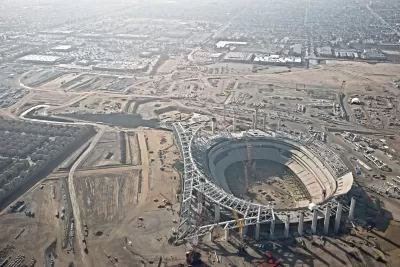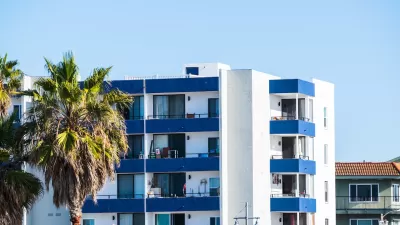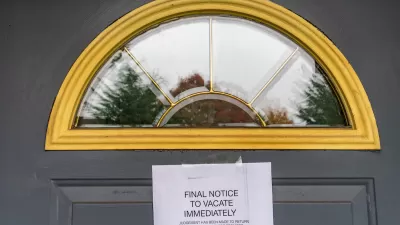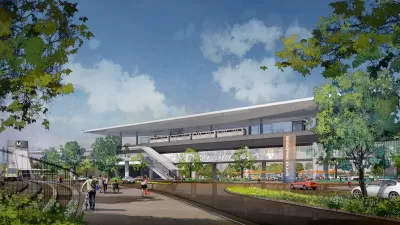Inglewood had fallen on hard times, but then plans for a massive sports and entertainment complex came along. While the city’s future is poised to change dramatically, the development is also displacing residents.

Angel Jennings writes about Inglewood, California, the location of a new NFL stadium and entertainment district. The city in southwest Los Angeles County has a long history as a black middle-class enclave, but social and economic changes starting in the 1970s resulted in a city in severe decline struggling with major fiscal challenges.
The situation in Inglewood has changed significantly in recent years with the arrival of the new stadium and related development, plans for a basketball arena that are taking shape, and spillover from the region’s technology sector. "But now that Inglewood is on the come up, longtime residents and city officials face a different challenge: Many who have weathered decades of hardship no longer can afford to live there and are being left out of the economic renaissance," says Jennings.
Housing prices are soaring in a city where three-quarters of residents are renters and the majority of the population is black and Latino. The result has been a flood of major rent increases and evictions that are displacing longtime residents. Uplift Inglewood, a tenants’ rights group, is suing to halt the arena project, and the city council last month approved a 45-day moratorium to cap rent increases and stop evictions.
But activists say the city is not doing enough to help Inglewood’s most vulnerable residents as the city’s economic tides change. "The temporary cap was a win for Uplift Inglewood, which continues to apply pressure to City Hall. It also is taking the fight to Sacramento, pushing for an anti-price-gouging bill," notes Jennings.
FULL STORY: One of California’s last black enclaves threatened by Inglewood’s stadium deal

Alabama: Trump Terminates Settlements for Black Communities Harmed By Raw Sewage
Trump deemed the landmark civil rights agreement “illegal DEI and environmental justice policy.”

Study: Maui’s Plan to Convert Vacation Rentals to Long-Term Housing Could Cause Nearly $1 Billion Economic Loss
The plan would reduce visitor accommodation by 25% resulting in 1,900 jobs lost.

Planetizen Federal Action Tracker
A weekly monitor of how Trump’s orders and actions are impacting planners and planning in America.

Waymo Gets Permission to Map SF’s Market Street
If allowed to operate on the traffic-restricted street, Waymo’s autonomous taxis would have a leg up over ride-hailing competitors — and counter the city’s efforts to grow bike and pedestrian on the thoroughfare.

Parklet Symposium Highlights the Success of Shared Spaces
Parklets got a boost during the Covid-19 pandemic, when the concept was translated to outdoor dining programs that offered restaurants a lifeline during the shutdown.

Federal Homelessness Agency Places Entire Staff on Leave
The U.S. Interagency Council on Homelessness is the only federal agency dedicated to preventing and ending homelessness.
Urban Design for Planners 1: Software Tools
This six-course series explores essential urban design concepts using open source software and equips planners with the tools they need to participate fully in the urban design process.
Planning for Universal Design
Learn the tools for implementing Universal Design in planning regulations.
Caltrans
Smith Gee Studio
Institute for Housing and Urban Development Studies (IHS)
City of Grandview
Harvard GSD Executive Education
Toledo-Lucas County Plan Commissions
Salt Lake City
NYU Wagner Graduate School of Public Service





























